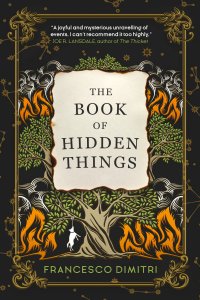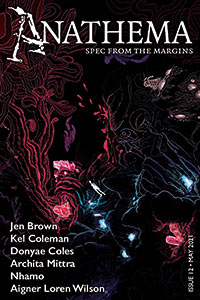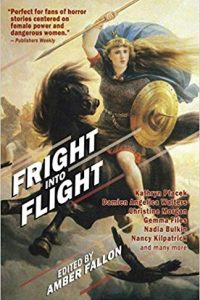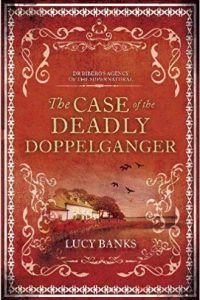Paul Di Filippo Reviews The Book of Hidden Things by Francesco Dimitri
The Book of Hidden Things, Francesco Dimitri (Titan 978-1-785-65707-8, $14.95, 385pp, trade paperback) July 2018
 Authors who write splendid books in languages other than their native tongue must all be rounded up and stopped, so they don’t make us struggling monolinguists look bad. Joseph Conrad, Vladimir Nabokov–well, they’re already canonized. But we still face Salman Rushdie, Hannu Rajaniemi, Thomas Olde Heuvelt, and Lavie Tidhar, among others. Their excellent prose in their secondary languages stands as a rebuke to us limited slackers.
Authors who write splendid books in languages other than their native tongue must all be rounded up and stopped, so they don’t make us struggling monolinguists look bad. Joseph Conrad, Vladimir Nabokov–well, they’re already canonized. But we still face Salman Rushdie, Hannu Rajaniemi, Thomas Olde Heuvelt, and Lavie Tidhar, among others. Their excellent prose in their secondary languages stands as a rebuke to us limited slackers.
Of course, such a program of imaginary suppression would not really lessen our shame, and so we must reluctantly abandon it. These polylinguists are just too awesomely unstoppable. And they arise in our midst at a steady, albeit not multitudinous rate. The latest is the Italian author Francesco Dimitri. The language in his new novel is eminently colloquial (almost entirely; I don’t think a native speaker would ever call a professional photographer a “snapper”); keenly revelatory of the narrators’ personalities; and contributory to the swift galloping suspense of the book. And the text is also funny, brutal, evocative and tragic by turns. I defy any writer to demand more of his prose.
The novel’s premise and plot and pacing are likewise superior, and the whole experience of reading The Book of Hidden Things is an affable and memorable one. It has elements of Ramsey Campbell and Stephen King, Lev Grossman and Haruki Murakami, blended into a unique gestalt.
The book’s time and place is our contemporary era and the country of Italy, district of Puglia. To be specific, an amiable nowheresville town of some thirty-five thousand inhabitants named Casalfranco, a minor resort without much to amuse its citizens. At this juncture, I must pause to commend Dimitri’s portrait of the land, its inhabitants and its institutions. The hot winds, the light, the fauna and flora, the landscape–all are sensually tangible. The effect is like being on vacation in Italy, like watching a fine Italian neorealist film–but without the portentousness of some, rather a lightly comedic outing, yet one with inescapable overtones of, well, more dire hidden things.
The sun is setting, but it is still high enough to trace the contours of the olive trees with razor-sharp clarity. This sort of light simply doesn’t exist in England; even on the brightest days, the English landscape has a mellowness, a misty blurring on the edges which makes features merge into one another. Here, boundaries arc defined, and each object is very much itself. That tree is only that tree; it has nothing to do with the earth it grows upon or the rocks surrounding it. This light has no patience for ambiguity.
This description occurs in the voice of one of our four protagonists, Fabio. He and two others–Mauro and Tony–alternate sections of the tale. What of the fourth man? That would be Art, who does not get to narrate because he has gone missing. (His nature emerges in rich backstory anecdotes, however.)
The four pals made a vow upon their secondary-school graduation, when they were all ready to leave Casalfranco for wider pastures of adulthood, that they would return once a year to renew their friendship. That was seventeen years ago. But at this newest anniversary, something is very wrong. Art–who came back to Casalfranco some time ago to settle in his ancestral home–has disappeared without explanation. This would be alarming enough without one earlier parallel: as a teen, Art disappeared for seven days, and resurfaced with an explanation that satisfied no one, and obviously concealed some enigmatic truth. Is his current absence related to that first disruption?
The three buddies set out to find their lost pal, their “mate,” in the UK parlance, because, as Tony opines, “Family and mates, they’re all that matters. Whatever they become, they’re all that matters.” This theme–the sanctity and bonds of blood and companionship–resonates throughout.
In a kind of mystery-cum-conspiracy-novel vibe, what they gradually discover about Art is that, while he was always a bit of an eccentric, a wild man, he has gone seemingly off the deep end. He is involved with dealing marijuana, with strange sexual and practices and possible vivisections. The occult too. Into the mix comes the local Mafia, an organization dubbed the Corona, whose scary, violent boss, Michele, is likewise looking for Art. Also in the unstable cauldron, along with a host of lesser characters, all very colorfully limned, are: Tony’s sister, Elena, and her husband Rocco, who are now part of the Corona; Fabio’s ailing father; Art’s several ex-lovers and customers; and Mauro’s family, wife Anna and two daughters, who have accompanied him to Casalfranco for a vacation. The fact that Fabio has long been in love with Anna does not exactly facilitate their investigations.
Over the course of just a few days, the buddies will experience awe and boredom, shock and confirmation, fear and grace. And where they discover Art’s manuscript, “The Book of Hidden Things,” revealing the truth of his teenage disappearance and much else, the action will shift into high gear. Ultimately, the tale will reveal itself to have an existential side, causing all the characters to reassess their lives: “Dying is a progressive shrinking that brings you from vastness to nothingness.”
My earlier references to a group of precedent-setting authors should be supportable now that you know this much about the book. The setup of the childhood pals unraveling a mystery is an homage to King’s Stand by Me (and that song is explicitly quoted by Dimitri). The uncanny incident from childhood that contours the adult life is a riff in Murakami’s Kafka on the Shore. The town that is mundane on the surface but laden with geographically and topographically linked magic is something out of Ramsey Campbell’s playbook. And the depiction of Art as a magician weighing the price of his soul against a possibly spurious paradise strikes me as a Lev Grossman motif. Lastly, I might allude to a modicum of Whitley Strieber-style paranormal influence.
But as I also said, Dimitri’s voice and his treatment of these components is uniquely his own. A certain pop culture sensibility and Mediterranean brio, as well as a groundedness in Italian cultural traditions, infuse this tale in a manner not often found in works by Anglo writers. Also, Dimitri keeps us guessing about the true nature of events more than these other writers. Truly supernatural or not? You’ll know for sure only on the final page, which offers a great kick.
Dimitri has a fine reputation and CV in his native land for at least four novels and other works. This book should see him firmly established in the English-speaking world as well.
 While you are here, please take a moment to support Locus with a one-time or recurring donation. We rely on reader donations to keep the magazine and site going, and would like to keep the site paywall free, but WE NEED YOUR FINANCIAL SUPPORT to continue quality coverage of the science fiction and fantasy field.
While you are here, please take a moment to support Locus with a one-time or recurring donation. We rely on reader donations to keep the magazine and site going, and would like to keep the site paywall free, but WE NEED YOUR FINANCIAL SUPPORT to continue quality coverage of the science fiction and fantasy field.








